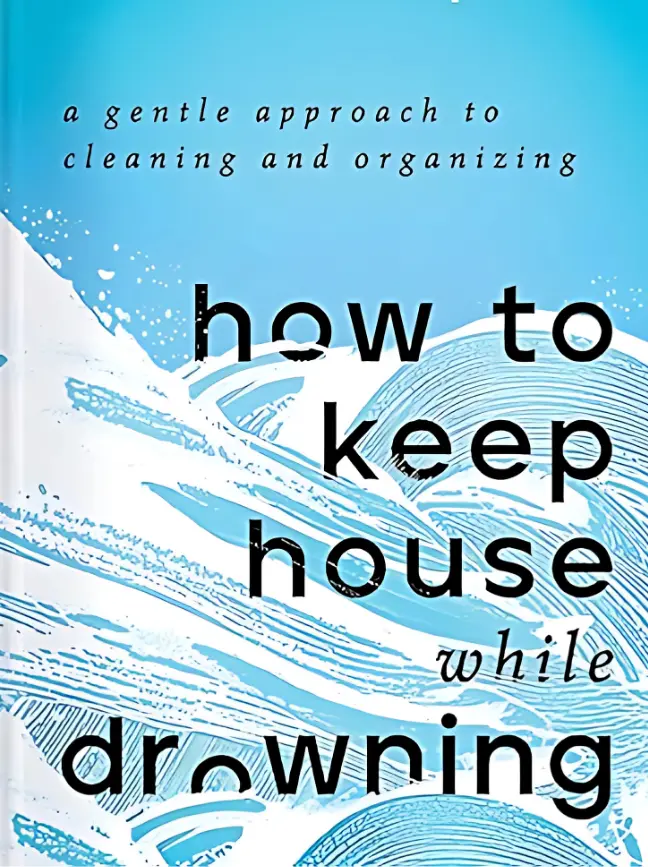chapter 32
rhythms over routines
dr. Lesley Cook, a brilliant psychologist who works with ADHD, once said to me, “Forget about creating a routine. You have to focus on finding your rhythm.”
With routines you are either on track or not. With rhythm you can skip a beat and still get back in the groove.
I used to try to do things as they looked like they needed to be done—changing the sheets when they looked dirty, running the dishwasher when it was full, doing laundry when I ran out of clean clothes. Except what actually happened was I would notice the sheets were dirty and then get around to changing them a month later, avoid the sink of dishes because it was overwhelming, and load up the laundry and forget it in the washer for three days and have to run it again. One problem was I was usually in the middle of doing something when I was noticing some care tasks that were “ready” to be addressed, which left me the options of saying either, “Oh, I’ll do that later,” and forgetting, or, “I better do that now so I don’t forget” and then forgetting the thing I was already in the middle of doing. I felt like I was constantly being pulled in a bunch of different directions and never actually having a home that functioned.
I was serving my home, but my home wasn’t serving me. I needed to change that. So I put the house on my schedule. As a mom and a neurodivergent person I’ve learned that I do well with daily and weekly rhythms. So I started doing laundry every Monday even when there were still clean clothes left, washing the sheets every Thursday even if they weren’t “too dirty,” and running my dishwasher every night even if it wasn’t full. Sure, I was doing things a little more often
or at times less often than they “should” be done, but who cares?
The best way to do something is the way it gets done.
rituals
If you are someone who can walk into a messy room and just start picking up random items and putting them away like some kind of freaking wizard, I am truly happy for you. I am not like that. I will wander around feeling overwhelmed for twenty minutes and then give up. Or I’ll start picking up random items only to hold them or set them somewhere else they don’t go before getting sucked into some tiny project that doesn’t matter like organizing my yarn collection.
Then I learned to work with my brain instead of against it. I came up with rituals that outlined exactly what I was to do in a room and exactly in what order. My Five Things Tidying Method is one such ritual. Closing duties is another. This allows me to hyperfocus on whatever list item I’m on like I’m on SEAL Team 6 or a character in a video game. There are all sorts of silly games I play with myself.
Sometimes I narrate in my head like I’m a world-renowned cleaning expert and everyone is watching me on television. This lets me block out everything else and gives me a way forward so my brain can go on autopilot. By virtually eliminating the decision-making of where to start or what to do next I can move from task to task with virtually no time in between. The momentum it creates circumvents a lot of executive functioning issues I experience.
new habits and systems
When you want to introduce some new habits or systems into your home to make things a bit more functional, don’t shoot for the moon.
Go for the closest to what you’re already doing with a little bit of increased function. Here are some examples:
If you tend to toss clothes into a certain chair all day, instead of saying, “That’s it! From now on everything goes straight to the
laundry room,” try just putting a laundry basket next to the chair and putting things into the laundry basket instead. Now you can take the whole basket to the laundry room when you can and it looks a little more contained until then.
If you tend to leave dishes everywhere, instead of saying, “From now on I’m going to wash every dish as soon as I use it,” instead try taking dishes to the sink when you’re done and just leaving them in there. Once a system becomes easy and automatic you can try another little tweak to increase the function even more. For example, maybe instead of putting the dishes into the sink you stack them up in categories on the side of the sink so that your sink is accessible.
If a system never becomes easy or automatic for you, then it just means either the system isn’t the right one for you or you need more tips and tools to get the system to work. The issue is never that you are failing or not good enough.
momentum over perfection
Two years ago I vowed to never do another diet or ever exercise from a motive of wanting to lose weight or be thinner. And so for two years I didn’t exercise. This past year, I finally felt a genuine desire to move my body, both for the pleasure of movement and for the health benefits. It’s a very different experience. For one, I’m really bad at it. I can only do it for very short periods. In the past, when I only exercised for the aesthetic benefits, my inability to do enough to lose weight was overwhelming and caused me to quit. These days, I find myself doing five minutes here and ten minutes there of the most low-impact exercise I can manage and instead of that being a failure in my eyes because it’s not enough to produce weight loss it has been a success because I know every minute is giving my body and mind a functional benefit. I’ve also come to realize that anything that creates momentum is a win. The momentum of getting on the exercise bike from time to time keeps me feeling as though I have the momentum to get myself on the exercise bike from time to time.
It’s becoming a part of my rhythm. It may not be a fast-paced regular
rhythm, it’s more like a slow, erratic jazz rhythm, but the momentum is there.
Creating momentum is key because motivation builds motivation.
Having a goal of momentum is great because it frees you to start with tasks that actually matter to you. For example, when it was difficult for me to find the motivation to do dishes or laundry I felt as though that should be the first thing to tackle. But what I did first was start putting slippers next to my bed at night. I realized that whenever I wake up in the morning and my feet are cold as I walk to the bathroom it was not only a super unpleasant experience, but it was also one I could rectify pretty easily. Is it a big deal? No. Is it silly to start with something so superficial when I could just suck it up and do what “really” matters? I don’t think so. When I started putting those slippers next to my bed at night it made those few morning minutes so pleasant that I actually felt an organic motivation to do it again the next night. You might think being cold for a few minutes in the morning should be a much lower priority than finding a way to get your dishes and laundry done, but motivation builds motivation.
We are learning to flex the muscles of motivation and rhythm and ritual.7 Practicing a care task you directly experience as actual care, like putting a pair of slippers by your bed at night, can help you get the motivation to do the other things as well. I’m not suggesting you try putting slippers by your bed—what you choose to practice on will be unique to what’s important to you. I’m also not saying it has to be a lifelong habit—just one to practice with for a bit. What is one thing you could do for yourself today that would be truly enjoyable for tomorrow you?
7 “Flexing the muscles of motivation” is another way of saying we are going to practice this
skill until it seems easier to us.
OceanofPDF.com






